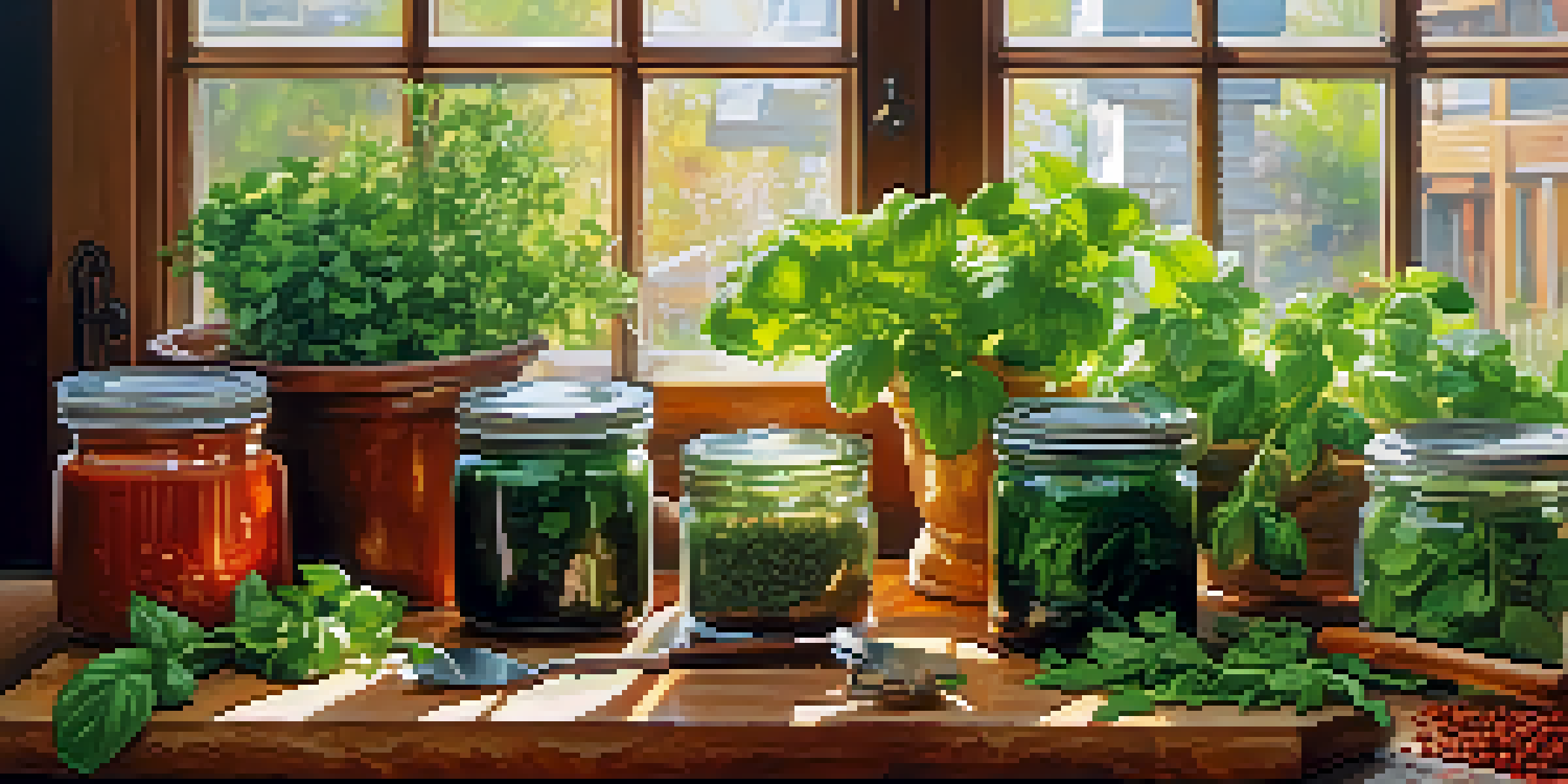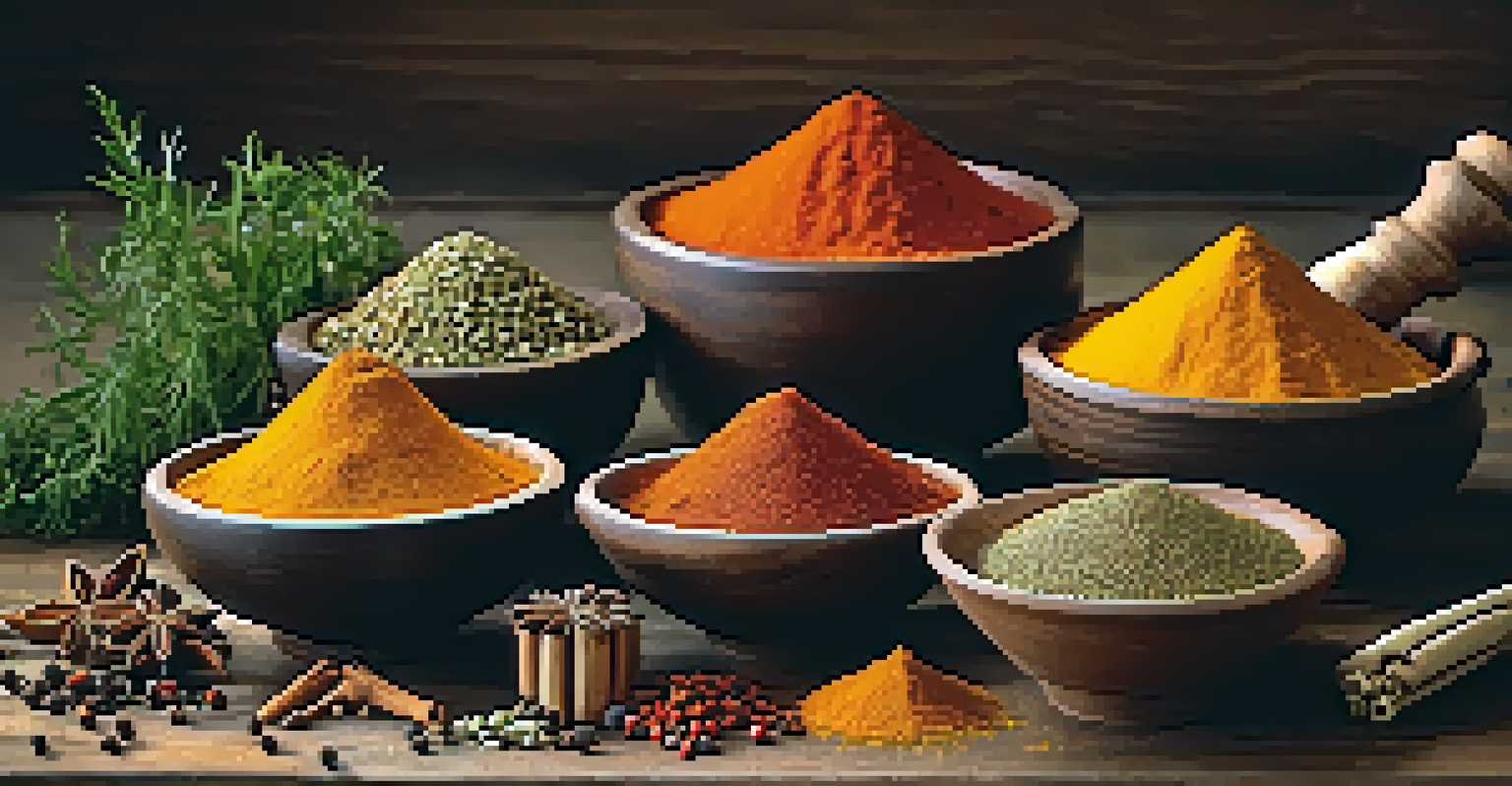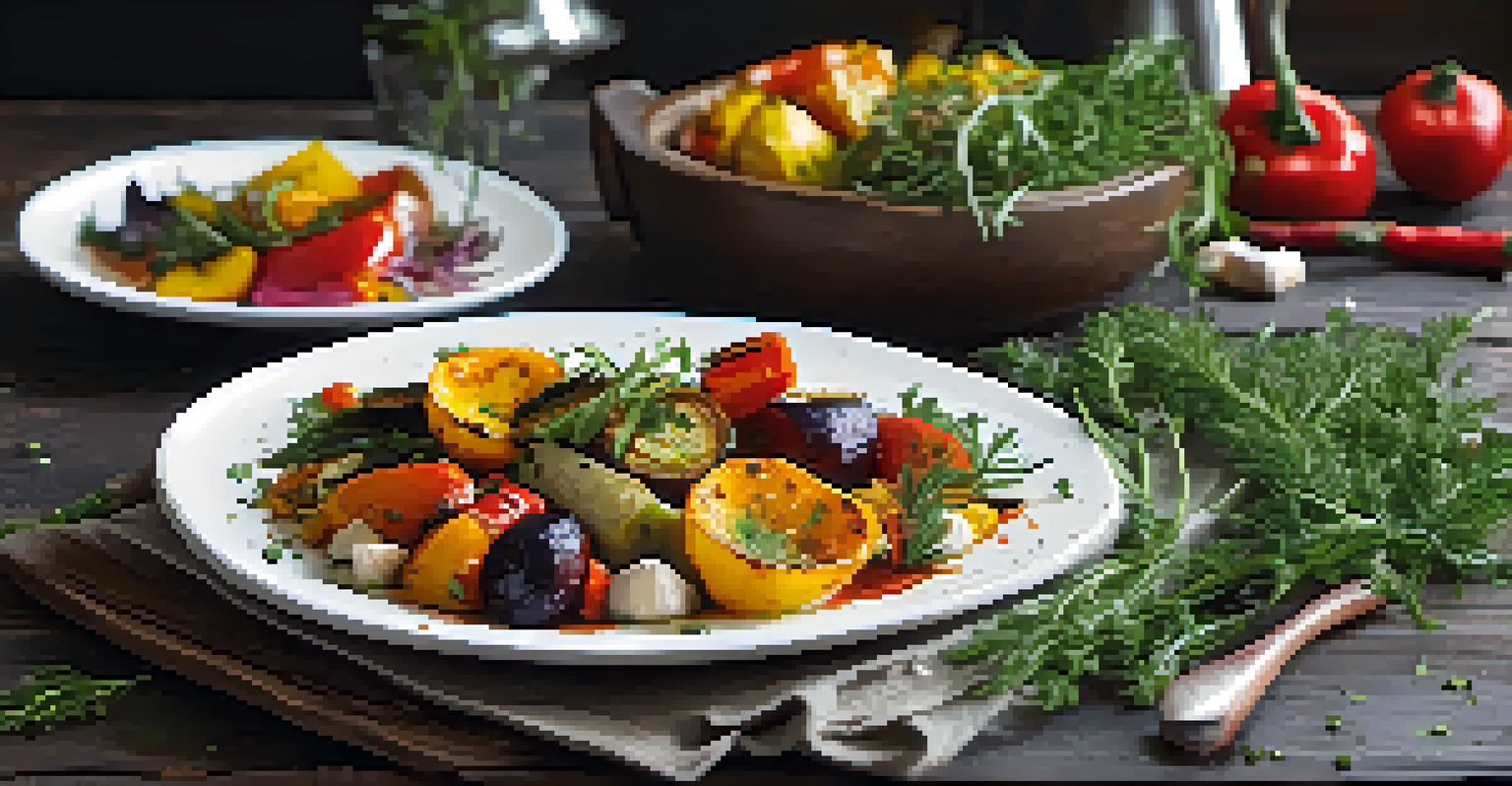Herbs and Spices: Key to Vibrant Vegetarian Flavor Profiles

Understanding the Role of Herbs and Spices in Cooking
Herbs and spices serve as the backbone of flavor in any dish, especially in vegetarian cooking. They can transform a simple meal into a culinary adventure, making vegetables shine in ways you might not have thought possible. By understanding the unique qualities of different herbs and spices, you can elevate your cooking and create dishes that are both vibrant and satisfying.
Herbs and spices are the most powerful flavoring agents in cooking, and they can transform a dish from ordinary to extraordinary.
For instance, consider how fresh basil can brighten a tomato sauce while cumin adds a warm earthiness to a chickpea curry. Each herb and spice has its own personality, and when used thoughtfully, they can enhance the natural flavors of ingredients. This is particularly important in vegetarian dishes, where the challenge lies in creating depth without relying on meat.
By combining various herbs and spices, you can create complex flavor profiles that make vegetarian meals not just enjoyable, but memorable. This exploration of flavors can also lead to exciting new culinary creations that surprise and delight your taste buds.
Fresh vs. Dried: Choosing the Right Form
When it comes to herbs, you often have a choice between fresh and dried varieties. Fresh herbs, like parsley and cilantro, tend to have a bright, vibrant flavor that can elevate a dish at the last minute. On the other hand, dried herbs, such as oregano and thyme, pack a concentrated punch and can provide a more subtle background flavor when cooked into dishes.

The key to using fresh versus dried herbs lies in understanding how they interact with heat. Fresh herbs are best added towards the end of cooking to preserve their flavor, while dried herbs can be added earlier as they need time to release their essential oils. This strategic timing can make all the difference in achieving a well-rounded flavor.
Herbs Enhance Vegetarian Dishes
Using a variety of herbs can elevate the flavors of vegetarian meals, making them vibrant and satisfying.
Ultimately, the choice between fresh and dried comes down to personal preference and the dish you’re preparing. Experimenting with both can help you discover which forms you enjoy most and how they can best complement your favorite vegetarian recipes.
Essential Herbs for Flavorful Vegetarian Cooking
There are a few herbs that every vegetarian cook should have in their pantry to create flavorful dishes. Basil, with its sweet and peppery notes, is perfect for Italian and Mediterranean recipes, while cilantro brings a fresh, zesty kick to Mexican and Asian cuisines. Other staples like rosemary and thyme add depth to roasted vegetables and hearty stews.
Cooking is like love. It should be entered into with abandon or not at all.
Mint is another versatile herb that can enhance both sweet and savory dishes, offering a refreshing contrast that’s especially delightful in salads or alongside grilled veggies. Don’t forget about dill, which can provide a unique zing to creamy dressings or potato dishes.
By keeping a variety of these essential herbs on hand, you’ll be well-equipped to whip up delicious vegetarian meals that are bursting with flavor and freshness. The more you experiment, the more you'll find your own personal favorites.
Spices: The Secret to Depth and Warmth
While herbs add brightness to dishes, spices bring depth and warmth. Think of spices like cumin, coriander, and paprika, which can transform a simple vegetable stir-fry into something extraordinary. Each spice contributes its own unique flavor, allowing you to play with different profiles to suit your taste.
For example, a sprinkle of smoked paprika can add a rich, smoky flavor to roasted chickpeas, while a dash of turmeric not only provides a vibrant yellow color but also a subtle earthiness that enhances many dishes. Spices can also help to balance flavors; a touch of cinnamon in a savory stew can add unexpected warmth and complexity.
Spices Add Depth and Warmth
Incorporating spices into your cooking can transform simple dishes into exciting culinary experiences.
Incorporating a variety of spices into your cooking can open up a world of flavor possibilities, making your vegetarian dishes not just nourishing but also exciting. Don't shy away from experimenting with different combinations to find what resonates with your palate.
Building Flavor with Blends and Seasoning Mixes
Creating your own spice blends is a fantastic way to elevate your vegetarian cooking. By combining spices like cumin, coriander, and chili powder, you can make a custom seasoning mix that’s perfect for tacos or roasted vegetables. This not only saves time but also ensures you have a consistent flavor profile that you love.
There are also many ready-made spice blends available that can make cooking even easier. From garam masala to Italian seasoning, these blends are crafted to provide a balanced flavor, helping you to quickly add depth to your meals without the guesswork.
Experimenting with different blends can also lead to exciting discoveries about flavor combinations you may not have considered. The right mix can make all the difference, turning a simple vegetable dish into a gourmet experience.
Herbs and Spices in Global Vegetarian Cuisine
Exploring global cuisines can significantly expand your understanding of how to use herbs and spices in vegetarian cooking. For instance, Indian cuisine is renowned for its use of spices, with blends like garam masala creating complex flavors in lentil dishes. Similarly, Mediterranean cuisines often highlight fresh herbs in salads, dips, and grilled vegetables.
In Thai cooking, the combination of fresh herbs like basil and mint with spices such as chili and ginger creates a vibrant and aromatic profile that’s hard to resist. Learning about these diverse culinary traditions can inspire you to try new ingredients and techniques in your own kitchen.
Global Cuisines Inspire Flavor Use
Exploring global cuisines expands your understanding of herbs and spices, enriching your vegetarian cooking.
By incorporating elements from different cultures, you not only enrich your vegetarian meals but also bring a world of flavors to your table. It’s a delicious way to broaden your culinary horizons while keeping your meals exciting.
Practical Tips for Using Herbs and Spices Effectively
To make the most of your herbs and spices, start with quality ingredients. Fresh herbs should be bright and fragrant, while spices should be aromatic and vibrant in color. Storing them properly—typically in a cool, dark place—can also help preserve their potency over time.
Another helpful tip is to toast your spices before using them. This simple technique releases essential oils and intensifies their flavor, making a noticeable difference in your dishes. For instance, toasting cumin seeds before grinding them can elevate their earthy notes significantly.

Finally, don’t be afraid to taste as you go! This practice not only helps you understand how flavors develop but also allows you to adjust seasonings to your liking. With practice, you’ll become more confident in your ability to create well-balanced and flavorful vegetarian dishes.